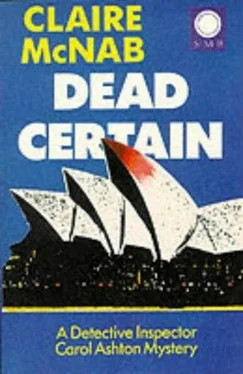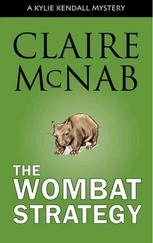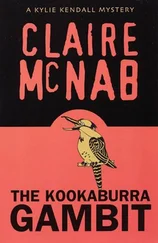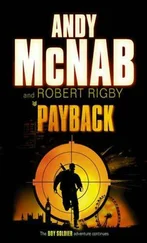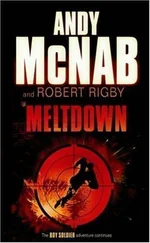Claire McNab - Dead Certain
Здесь есть возможность читать онлайн «Claire McNab - Dead Certain» весь текст электронной книги совершенно бесплатно (целиком полную версию без сокращений). В некоторых случаях можно слушать аудио, скачать через торрент в формате fb2 и присутствует краткое содержание. Жанр: Детектив, на английском языке. Описание произведения, (предисловие) а так же отзывы посетителей доступны на портале библиотеки ЛибКат.
- Название:Dead Certain
- Автор:
- Жанр:
- Год:неизвестен
- ISBN:нет данных
- Рейтинг книги:5 / 5. Голосов: 1
-
Избранное:Добавить в избранное
- Отзывы:
-
Ваша оценка:
- 100
- 1
- 2
- 3
- 4
- 5
Dead Certain: краткое содержание, описание и аннотация
Предлагаем к чтению аннотацию, описание, краткое содержание или предисловие (зависит от того, что написал сам автор книги «Dead Certain»). Если вы не нашли необходимую информацию о книге — напишите в комментариях, мы постараемся отыскать её.
Dead Certain — читать онлайн бесплатно полную книгу (весь текст) целиком
Ниже представлен текст книги, разбитый по страницам. Система сохранения места последней прочитанной страницы, позволяет с удобством читать онлайн бесплатно книгу «Dead Certain», без необходимости каждый раз заново искать на чём Вы остановились. Поставьте закладку, и сможете в любой момент перейти на страницу, на которой закончили чтение.
Интервал:
Закладка:
“I don’t listen to gossip,” he assured her quickly.
“It’s not gossip I’m interested in, but your personal impressions. And of course, anything you say will be treated in confidence.” He looked both flattered and wary as she went on, “As an outsider I’m at a disadvantage, so I need the insights you can give me.”
She thought, Have I laid it on too thick ? but was reassured by Douglas Binns’s proud little smile.
“Well, yes, Inspector, of necessity I must know what’s going on…”
It was easy after that. He freely discussed the complicated web of allegiances, alliances, rivalries and open conflicts that, he assured Carol, characterized most artistic communities. He answered her specific questions about Collis Raeburn’s relationships with a frankness that seemed to surprise him. “Inspector, I hope you don’t think I discuss these matters on any other occasions. Even my wife doesn’t know these details…”
Bells rang to indicate that Aïda would soon commence and in obedience to their gentle insistence, people began to straggle towards the entrances to the opera hall.
Binns was obviously rather taken with Anne in her metallic green dress. “Almost fifteen hundred and fifty seats,” he said to her as he led them into their box high on the dull black left wall.
Out of habit Carol surveyed her surroundings carefully. A swelling murmur filled the opera theater as people crowded in, their animated conversations competing with discordant sounds from the cramped pit as the orchestra tuned up. Red seats with armrests in the familiar blond wood rose in tiers with no central aisle, so those in the center had to shuffle sideways past patrons already seated. The lighting was subdued, the banks of floodlights dark as they stared blankly at the heavy curtain masking the stage.
Binns was gazing around with proprietary pride. “Acoustics in the opera hall are very satisfactory,” he said. “One point four reverb time!” He looked from Carol to Anne, as though expecting an admiring response. “You know, of course, that the singers use no electronic amplification.”
“Why doesn’t the orchestra drown them out?”
Anne’s question pleased him. “I imagine,” he said with a faintly superior smile, “that most-if not all-popular singing is very much the product of microphones and sound engineers, so that even a thin voice can be given weight and timbre electronically. This is not the case in grand opera. The voice is an instrument, and the singer must provide the controlled power and resonance to be in partnership with the orchestra, and often to soar above it.”
Anne looked impressed. “They don’t only have to compete with an orchestra, they have to act and sing in a foreign language, all at the same time. What happens if they get confused?”
Binns was clearly delighted with her appreciation of the rigors of opera. “Singers do have a little help,” he said. “When the curtain goes up, you’ll notice a little hood center stage front. It hides the prompt, who sits suspended over part of the orchestra pit in a space so small it’s like sitting in a racing car.”
The flutter of programs and the hum of voices stilled as the conductor entered. He acknowledged the applause, then turned to the orchestra. As the soft violins that introduced the prelude continued to soar above the threatening bass line, Carol consciously relaxed the tight muscles in her shoulders, determined to escape into the music.
The curtain slowly rose to show a vast columned hall with pyramids and temples in the background. Spontaneous applause broke out at the designer’s achievement and at the hypnotically splendid Egyptian costumes. Carol was fascinated to see Lloyd Clancy stride to center stage. Gone was the cultured rogue with the ready smile and the wry humor she had encountered in the dressing room. He had been transformed into a young soldier, Radames, chosen by the goddess Isis to lead the Egyptian armies to victory against the Ethiopians. He sang with youthful joy the meltingly gorgeous “Celeste Aïda.” Carol found herself holding her breath. “Wow,” said Anne beside her as the last notes died to a rumble of applause.
A subtly glowing strip above the stage contained the subtitles, a continuous translation of the Italian into English as phrases were sung. “ Ritorna vincitor !” sang the chorus with thrilling force: “So conquer and return!” the subtitles declared. At first Carol found the continuous translation distracting, but soon she seemed to absorb the words automatically, so that it was almost as if she understood Italian.
Initially Carol thought Alanna Brooks too mature and heavily built for the role of the young Aïda, but the moment she began to sing, her voice, pure and piercingly beautiful, overrode this impression. She was Aïda, daughter of the king of Ethiopia, sold into slavery to the pharaoh’s daughter, Amneris, who loved, as did Aïda, the young soldier, Radames.
After the Grand March an overwhelming mass of choral sound arose as the solo singers strove to be heard above the chanting of the priests, the cries of the captives and the shouts of the crowd. The descent of the curtain and the buzz from the audience as the lights came up for an interval was an unwelcome intrusion into the intoxicating world that the opera had created.
Resenting the return of reality, Carol remained almost silent, as Binns and Anne chatted about the gratifying fact that, for once, Edward Livingston had not tried to modernize or change the opera. As she sipped the champagne Binns had provided with somewhat self-satisfied facility, Carol wondered if the love triangle in Aïda had disturbing parallels with her own life. Unwillingly she thought of Madeline and Sybil as two points of a triangle of which she was the third. But wasn’t she just romanticizing what was merely a disconcerting physical response to Madeline Shipley? Her thoughts moved on to the investigation. Had Collis Raeburn been one point in a romantic triangle? Was the key to his death held by a jealous lover?
As the third act began, Carol was preoccupied with the motives that might lie behind Collis Raeburn’s death. Who, male or female, had loved, and then hated him enough to murder him? A sudden thought intruded: could he have actually killed himself in remorse for unknowingly infecting someone he loved with AIDS?
She was swept back into the music. In the moonlight on the banks of the Nile by the Temple of Isis, Alanna Brooks began to sing an exquisite lament. “Oh native skies… never shall I see thee more,” declared the subtitles. Carol shut her eyes, surrendering to the sensuous beauty of the melody.
Later, following Binns through the warren of corridors with Anne, the magical world created by the performance was dissipated. Robed priests, who a few minutes before had been singing sonorous condemnations as they lowered the slab of stone that would forever entomb Radames and Aïda, were now a motley crowd engaged in mundane conversation as they made their way back to the dressing rooms.
The cream-colored door to Alanna Brooks’s dressing room was open, with noise and people spilling out into the wide corridor. Binns efficiently, and officiously, shepherded everyone out, and then ushered Carol and Anne in.
The earlier meeting had been so brief that Carol had formed only a faint impression of Alanna Brooks, so she was fascinated to meet her now, particularly after seeing the ravishing performance she had given in the opera.
The diva sat at a mirror taking off her makeup. Seen close up, the illusion created on the stage dissolved. Shorter than Carol had remembered, she was big-busted and a little thick around the waistline. Her hair was reddish-brown and her skin pale and lightly freckled. Although laughter lines fanned from the corners of her eyes and her skin had coarsened a little, she had an amused confidence that made her seem much younger. “Inspector Ashton. At last! I’m so sorry to have been so difficult about this interview.”
Читать дальшеИнтервал:
Закладка:
Похожие книги на «Dead Certain»
Представляем Вашему вниманию похожие книги на «Dead Certain» списком для выбора. Мы отобрали схожую по названию и смыслу литературу в надежде предоставить читателям больше вариантов отыскать новые, интересные, ещё непрочитанные произведения.
Обсуждение, отзывы о книге «Dead Certain» и просто собственные мнения читателей. Оставьте ваши комментарии, напишите, что Вы думаете о произведении, его смысле или главных героях. Укажите что конкретно понравилось, а что нет, и почему Вы так считаете.
